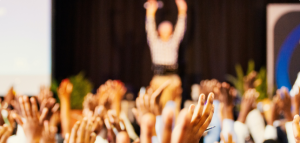We Need To Talk About How July 4th Isn’t My Independence Day
I have never been taught a vision of freedom that unpacks the complexities and intersections of my identities. As an American whose identity has been historically marginalized, I must radically imagine what freedom looks like for people like me in the United States. I must radically redefine what liberation looks like for myself, which includes centering the stories of the people who are oppressed in America today.
Independence Day is here and I once again find myself questioning who July 4th is for. I know three things about the holiday: 1) It celebrates the independence of white men in America, as most American traditions repeatedly do; 2) My entire life, it was taught to me as a celebration of freedom; and 3) It is not mine.
Growing up in the United States, I learned that freedom is something that is given to all of us because we live here. Floods of people stepping onto land in America through Ellis Island in New York City is the image that often comes to mind when I think about independence and freedom. In elementary school, our class took field trips to Ellis Island to hear the stories of the thousands that risked their lives for a chance at freedom—what I learned as an opportunity.
This version of freedom that July 4th celebrates belongs to white, hetero, cis-men. Their version of freedom was taught in classrooms. And it was what my grandfather taught my mother when he traveled to the United States in pursuit of financial wealth, putting all of his children to work. It was what my mother taught me despite working at a clothing factory that paid her below the legal minimum wage once she was granted her working visa. The goal was for progress, equalling monetary funds to build a foundation. Till this day I see American freedom, on July 4th, as the capitalist belief that working hard can afford us better lives. You have to sweat for financial freedom and America provided that opportunity.
I quickly came to realize that this history dissolved me of my identity as a queer Dominican American woman growing up in Brooklyn’s New York City Housing Authority’s projects at the height of the 2000s. These experiences make me an American. They make everyone I spent my life with American, regardless of immigration status. So where was the promised freedom I learned about in textbooks?
July 4th brings up questions of belonging and reminders of the fact that we are still struggling. On July 4th, we need to make the conscious decision to remember the plight of thousands of people in America whose oppression is hiding under this presumptuous promise of independence. I cannot forget about the millions of Americans incarcerated, most because of prejudices associated with the color of their skin. I cannot escape stories of black and brown LGBTQ people dead because they chose freedom that is radical and nonexistent in 2019 United States. As a first-generation American, I cannot just ignore the overcrowded, squalid conditions at the immigrant detention centers in the South. I cannot let this image, of children without showers and hot meals, escape my memory on America’s day of Independence.
At Peace is Loud, we talk about the perspectives and stories of marginalized peoples. This includes looking critically at the traditions that we hold dear so that we can break them down. We need to look deeper and beyond the stories that we are fed about our country’s history. When we talk about peace at Peace is Loud, we talk about highlighting the stories that don’t often get told to create space for the radical, imaginary futures that people who have lived in the margins deserve.
Emily del Carmen Ramirez is Peace is Loud’s Digital Engagement Coordinator. Emily was born and raised in Brooklyn, NY. In her free time, she writes poetry and essays that speak the narratives of her life. She also runs a community program in Brooklyn, called “I’m Taking My Body Back,” to incite dialogue with young women of color on reproductive justice and address why they are so often left out of critical conversations that affect their well-being and futures, with the end goal of creating poetry that tells these stories.


